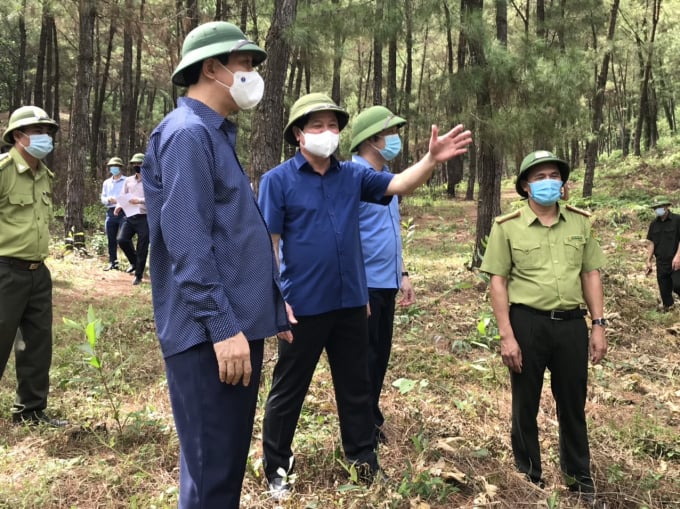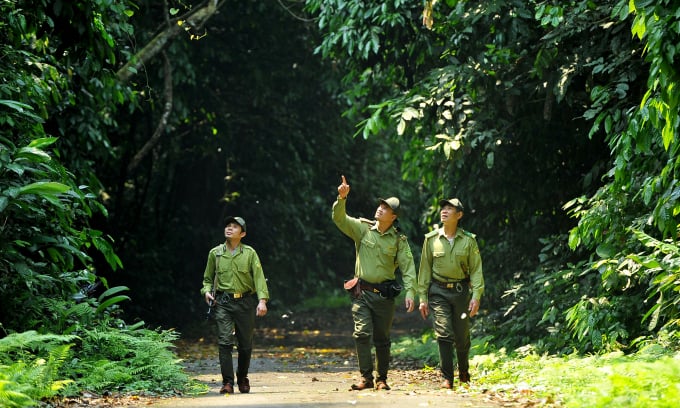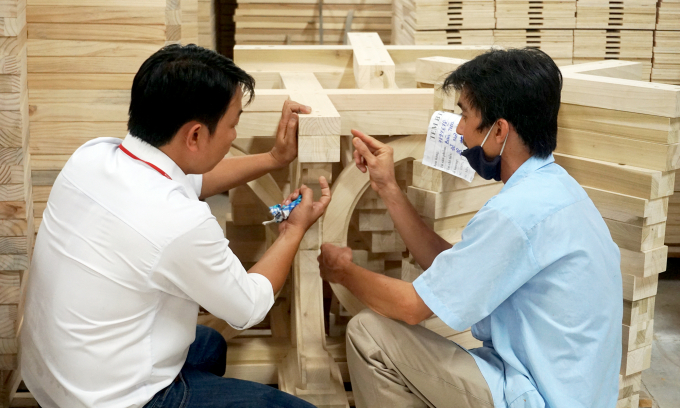May 19, 2025 | 02:06 GMT +7
May 19, 2025 | 02:06 GMT +7
Hotline: 0913.378.918
May 19, 2025 | 02:06 GMT +7
Hotline: 0913.378.918

Deputy Minister Le Quoc Doanh (centre) inspects forest fire prevention in Thanh Hoa province. Photo: Vo Dung.
The 6 specific goals in Decision 60 set by the General Department of Forestry include:
- The growth rate of forestry production value is from 5.0% to 5.5% per year.
- Export value of wooden furniture and non-timber forest products reached US$ 18 - 20 billion; consumption of forest products in the domestic market will reach US$ 5 billion by 2025.
- Improve productivity and quality of planted forests; timber output from concentrated plantations will reach 35 million m3 each year by 2025; basically meet the demand for raw materials for processing wood and forest products; certificate of sustainable forest management reaches over 0.5 million hectares in the period of 2021 - 2025.
- Develop ecosystem services, forest environment services, diversify and expand revenue sources; the total annual revenue of forest environmental services increases by 5%.
- The proportion of laborers working in forestry with vocational training will be about 45% by 2025; the average income of ethnic minority people working in forestry increase more than 2 times compared to 2020.
- Improve the quality of natural forests, the effectiveness of biodiversity conservation and the protection capacity of forests; forest cover rate is maintained at 42%.
On the basis of maximum mobilization of social resources; applying advanced and modern science and technology, the forestry industry is oriented to make an increasing contribution to the process of socio-economic development, environmental protection, water security, natural disaster reduction, respond proactively and effectively to climate change, conserve natural resources and biodiversity, provide a variety of forest ecosystem services.

The forestry sector strives to achieve a stable forest cover of 42%. Photo: TL.
This is a premise for the forestry sector to contribute to hunger eradication and poverty alleviation, improving the livelihoods of rural and mountainous people and ethnic minorities, maintaining national defense and security, and successfully implementing the national goals on sustainable development.
In order to effectively and timely implement Decision 60, the General Department of Forestry has set out 7 main groups of solutions and tasks in the coming time.
Firstly, continue to innovate, perfect mechanisms and policies, and mobilize resources. The General Department continues to effectively implement the Law on Forestry; documents guiding the implementation of the Law on Forestry; Vietnam's forestry development strategy for the period of 2021 - 2030, with a vision to 2050; National forestry master plan for the period of 2021 - 2030, with a vision to 2050; Sustainable forestry development program for the period of 2021 - 2025.
The second is to strengthen propagating and raise awareness. In which, the forestry sector will focus on communication with rich content and diverse forms, promoting modern communication and social networks to create a change in awareness about forest protection and development; pay attention to cultural and ethnic factors in propagating; strengthen legal education on forest protection and development, raise people's awareness of forest protection; mobilize households living in and near forests to sign commitments to forest protection; develop and implement forest protection conventions.

In 2021, the total export value of the forestry industry would reach US$ 15.87 billion. Photo: TL.
The third is to develop and improve research, transfer and application of science and technology and forestry extension. This is an important task, helping the forestry sector maintain its growth rate, as well as building and perfecting economic and technical norms in forestry; develop a system of national regulations and standards on forestry; to create new varieties of high-yielding forestry plants, to intensively cultivate forests, to exploit, transport and process forest products.
The fourth is to innovate and improve the quality of human resource training of the industry. The forestry sector gives priority to focusing on training high-quality human resources for the industrialization and modernization of the forestry sector; expand forms of vocational training associated with new technology transfer.
The fifth is to build a synchronous forestry infrastructure, modernize the forestry industry and provide logistics services. The main tasks include: Reorganizing the concentrated production areas in the direction of developing key products in accordance with the advantages of each region in association with synchronous mechanization and connection between forest product processing zones and commercial services; to step up investment and complete synchronous forestry infrastructure; step up synchronous modernization, mechanization and automation in concentrated commodity forestry production areas.
The sixth is to improve operational efficiency and organization of production and business. The forestry sector will develop forms of linkage between economic sectors, cooperation and sharing economy in forestry; develop diversified production and business, associate afforestation with processing industry and trade in forest products value chain; at the same time encouraging the development of large enterprises and corporations capable of investing in closed chains in the forestry industry.
The seventh is to strengthen international cooperation, to exploit the market potential well from international agreements and commitments. In which, promoting the implementation of bilateral and multilateral international agreements such as: Voluntary Partnership Agreement on Forest Law Enforcement, Forest Governance and Trade (VPA/FLEGT); The EU-Vietnam Free Trade Agreement (EVFTA), etc.
In order to implement synchronously, the General Department of Forestry requires the agencies under the General Department and the Forest Protection Departments of the provinces and centrally-run cities to report on the results of the implementation of tasks for the period of 6 months (before the deadline June 10) and annually (before December 10) to the Department of Planning and Finance (General Department of Forestry).
Translated by Duc Thuan

(VAN) The decree on Extended Producer Responsibility (EPR) ensures transparent management and disbursement of support funds, avoiding the creation of a “give-and-take” mechanism.

(VAN) Hue City rigorously enforces regulations regarding marine fishing and resource exploitation, with a particular emphasis on the monitoring of fishing vessels to prevent illegal, unreported, and unregulated (IUU) fishing.

(VAN) Hanoi People's Committee has issued a plan on reducing greenhouse gas emissions in the waste management sector with 2030 vision.

(VAN) Vietnam's draft amendment to Decree No. 156 proposes a mechanism for medicinal herb farming under forest canopies, linking economic development to population retention and the sustainable protection and development of forests.

(VAN) In reality, many craft village models combined with tourism in Son La have proven effective, bringing significant economic benefits to rural communities.

(VAN) The international conference titled Carbon Market: International experiences and recommendations for Vietnam was successfully held recently in Ho Chi Minh City.

(VAN) According to the Project on rearranging provincial and communal administrative units, in 2025, the country will have 34 provinces/cities, 3,321 communes, wards, and special zones, and no district-level organization.